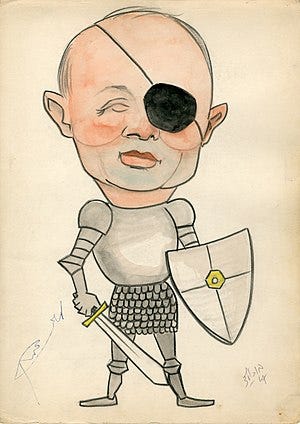The IDF General Command Must Be An Exciting Place To Work
אמיר ברעם is the second in command to Chief Of Staff הרצי הלוי. The 2 apparently don't get along.
From the Times Of Israel:
IDF deputy chief of staff requests to step down, indicates he hopes to succeed Halevi
Israel Defense Forces Deputy Chief of Staff Maj. Gen. Amir Baram on Friday notified his commander, IDF Chief of Staff Lt. Gen. Herzi Halevi, that he would finish his role as planned at the end of February.
Several months ago, Baram was asked to extend his two-year tenure as deputy chief of staff by six months due to the ongoing war.
In a letter to Halevi that was leaked to the media, Baram said since the intensity of the war has recently “decreased significantly,” he feels that currently his “ability to contribute as deputy chief of staff is limited.”
The remarks appeared to be a veiled criticism of Halevi, who has indicated he would resign from the military over his involvement in the failures that led to the October 7, 2023, onslaught, though he has yet to do so.
Now, you might think that having a dysfunctional general staff during wartime would be a problem, but it seems to have worked out pretty well in the past. Here’s a doozy of a headline from 1992:
Rabin Admits He Had a Breakdown, As Parties Agree to Stop Heckling
Rabin was Israel Defense Force chief of staff in May 1967, a time of tension in Israel. Egyptian President Gamel Abdel Nasser was said to be massing troops in Sinai and U.N. Secretary-General U Thant had ordered U.N. truce observer forces out of the Israeli-Egyptian border zone.
Rabin told Hadashot that he was working under intense military and political pressures at the time. Responsibility for keeping the IDF instantly ready for battle rested entirely on his shoulders, he said.
One night, his wife Leah insisted he must rest. She called an army medical officer who administered a sedative. Rabin said he slept for the next 24 hours to regain his strength.
Rabin’s 24-hour breakdown was disclosed in 1974 by Gen. Ezer Weizman, who was deputy chief of staff in 1967. Weizman was trying at the time to convince Labor to choose Shimon Peres instead of Rabin as its leader.
In the run-up to the Six-Day War, in 1967, as the Arab armies were gathering to attack Israel, Rabin, at that time the I.D.F. chief of staff, suffered a nervous collapse. He considered stepping down, but pulled himself together and oversaw Israel’s sweeping victory. “I had to hold his balls,” his deputy, Ezer Weizman, said.
In any event, it seems to be something of a tradition for the chief of staff to really not have the greatest working relationship with his deputy. Per Yossi Yehoshua, military correspondent from Ynet, (via google translate:)
The relationship between Chief of Staff Maj. Gen. Herzi Halevi and his deputy, Maj. Gen. Amir Baram, is neither the first nor the fifth to end in a galactic explosion. Chief of Staff Moshe Levy gossiped to Yitzhak Rabin that his deputy Dan Shomron was gay in order to thwart his appointment as Chief of Staff, Shaul Mofaz attacked Uzi Dayan at his replacement ceremony in front of the stunned audience, and Dan Halutz said, at the end of the Second Lebanon War, that "it hurts the most for a pilot when his number two shoots him in the back" and denied that he meant his deputy, Moshe Kaplinsky. It's hard to say that the public was convinced. Even when Halevy was Aviv Kochavi's deputy, disputes arose and serious allegations were made.
Someone once said that the reason why the state of Israel has never had a military coup is because that would require 3 generals to actually agree on something…





I like the last line
Still hard to digest at age 59 the disintegration of heroes and the realization that there are much more Chelm aspects to Israel then a dreamer would dream or a hater would curse with...
Imagine the conversations happening we've not heard